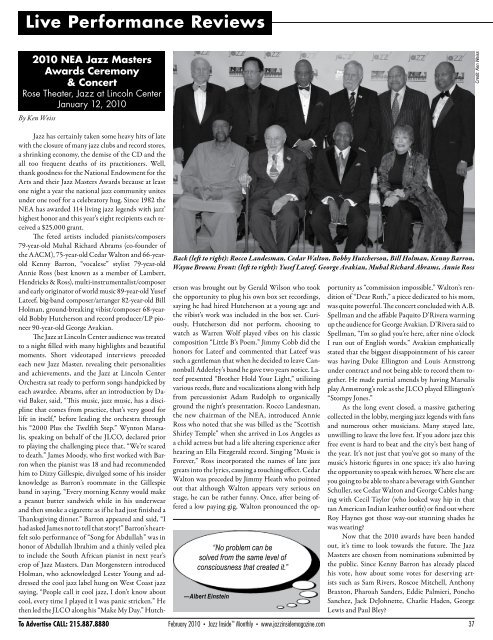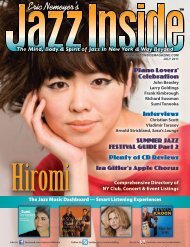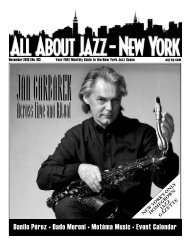February 2010 issue - Jazz Singers.com
February 2010 issue - Jazz Singers.com
February 2010 issue - Jazz Singers.com
You also want an ePaper? Increase the reach of your titles
YUMPU automatically turns print PDFs into web optimized ePapers that Google loves.
Live Performance Reviews<br />
<strong>2010</strong> NEA <strong>Jazz</strong> Masters<br />
Awards Ceremony<br />
& Concert<br />
Rose Theater, <strong>Jazz</strong> at Lincoln Center<br />
January 12, <strong>2010</strong><br />
By Ken Weiss<br />
<strong>Jazz</strong> has certainly taken some heavy hits of late<br />
with the closure of many jazz clubs and record stores,<br />
a shrinking economy, the demise of the CD and the<br />
all too frequent deaths of its practitioners. Well,<br />
thank goodness for the National Endowment for the<br />
Arts and their <strong>Jazz</strong> Masters Awards because at least<br />
one night a year the national jazz <strong>com</strong>munity unites<br />
under one roof for a celebratory hug. Since 1982 the<br />
NEA has awarded 114 living jazz legends with jazz’<br />
highest honor and this year’s eight recipients each received<br />
a $25,000 grant.<br />
The feted artists included pianists/<strong>com</strong>posers<br />
79-year-old Muhal Richard Abrams (co-founder of<br />
the AACM), 75-year-old Cedar Walton and 66-yearold<br />
Kenny Barron, “vocalese” stylist 79-year-old<br />
Annie Ross (best known as a member of Lambert,<br />
Hendricks & Ross), multi-instrumentalist/<strong>com</strong>poser<br />
and early originator of world music 89-year-old Yusef<br />
Lateef, big-band <strong>com</strong>poser/arranger 82-year-old Bill<br />
Holman, ground-breaking vibist/<strong>com</strong>poser 68-yearold<br />
Bobby Hutcherson and record producer/LP pioneer<br />
90-year-old George Avakian.<br />
The <strong>Jazz</strong> at Lincoln Center audience was treated<br />
to a night filled with many highlights and beautiful<br />
moments. Short videotaped interviews preceded<br />
each new <strong>Jazz</strong> Master, revealing their personalities<br />
and achievements, and the <strong>Jazz</strong> at Lincoln Center<br />
Orchestra sat ready to perform songs handpicked by<br />
each awardee. Abrams, after an introduction by David<br />
Baker, said, “This music, jazz music, has a discipline<br />
that <strong>com</strong>es from practice, that’s very good for<br />
life in itself,” before leading the orchestra through<br />
his “2000 Plus the Twelfth Step.” Wynton Marsalis,<br />
speaking on behalf of the JLCO, declared prior<br />
to playing the challenging piece that, “We’re scared<br />
to death.” James Moody, who first worked with Barron<br />
when the pianist was 18 and had re<strong>com</strong>mended<br />
him to Dizzy Gillespie, divulged some of his insider<br />
knowledge as Barron’s roommate in the Gillespie<br />
band in saying, “Every morning Kenny would make<br />
a peanut butter sandwich while in his underwear<br />
and then smoke a cigarette as if he had just finished a<br />
Thanksgiving dinner.” Barron appeared and said, “I<br />
had asked James not to tell that story!” Barron’s heartfelt<br />
solo performance of “Song for Abdullah” was in<br />
honor of Abdullah Ibrahim and a thinly veiled plea<br />
to include the South African pianist in next year’s<br />
crop of <strong>Jazz</strong> Masters. Dan Morgenstern introduced<br />
Holman, who acknowledged Lester Young and addressed<br />
the cool jazz label hung on West Coast jazz<br />
saying, “People call it cool jazz, I don’t know about<br />
cool, every time I played it I was panic stricken.” He<br />
then led the JLCO along his “Make My Day.” Hutch-<br />
Back (left to right): Rocco Landesman, Cedar Walton, Bobby Hutcherson, Bill Holman, Kenny Barron,<br />
Wayne Brown; Front: (left to right): Yusef Lateef, George Avakian, Muhal Richard Abrams, Annie Ross<br />
erson was brought out by Gerald Wilson who took<br />
the opportunity to plug his own box set recordings,<br />
saying he had hired Hutcherson at a young age and<br />
the vibist’s work was included in the box set. Curiously,<br />
Hutcherson did not perform, choosing to<br />
watch as Warren Wolf played vibes on his classic<br />
<strong>com</strong>position “Little B’s Poem.” Jimmy Cobb did the<br />
honors for Lateef and <strong>com</strong>mented that Lateef was<br />
such a gentleman that when he decided to leave Cannonball<br />
Adderley’s band he gave two years notice. Lateef<br />
presented “Brother Hold Your Light,” utilizing<br />
various reeds, flute and vocalizations along with help<br />
from percussionist Adam Rudolph to organically<br />
ground the night’s presentation. Rocco Landesman,<br />
the new chairman of the NEA, introduced Annie<br />
Ross who noted that she was billed as the “Scottish<br />
Shirley Temple” when she arrived in Los Angeles as<br />
a child actress but had a life altering experience after<br />
hearing an Ella Fitzgerald record. Singing “Music is<br />
Forever,” Ross incorporated the names of late jazz<br />
greats into the lyrics, causing a touching effect. Cedar<br />
Walton was preceded by Jimmy Heath who pointed<br />
out that although Walton appears very serious on<br />
stage, he can be rather funny. Once, after being offered<br />
a low paying gig, Walton pronounced the op-<br />
“No problem can be<br />
solved from the same level of<br />
consciousness that created it.”<br />
— Albert Einstein<br />
portunity as “<strong>com</strong>mission impossible.” Walton’s rendition<br />
of “Dear Ruth,” a piece dedicated to his mom,<br />
was quite powerful. The concert concluded with A.B.<br />
Spellman and the affable Paquito D’Rivera warming<br />
up the audience for George Avakian. D’Rivera said to<br />
Spellman, “I’m so glad you’re here, after nine o’clock<br />
I run out of English words.” Avakian emphatically<br />
stated that the biggest disappointment of his career<br />
was having Duke Ellington and Louis Armstrong<br />
under contract and not being able to record them together.<br />
He made partial amends by having Marsalis<br />
play Armstrong’s role as the JLCO played Ellington’s<br />
“Stompy Jones.”<br />
As the long event closed, a massive gathering<br />
collected in the lobby, merging jazz legends with fans<br />
and numerous other musicians. Many stayed late,<br />
unwilling to leave the love fest. If you adore jazz this<br />
free event is hard to beat and the city’s best hang of<br />
the year. It’s not just that you’ve got so many of the<br />
music’s historic figures in one space; it’s also having<br />
the opportunity to speak with heroes. Where else are<br />
you going to be able to share a beverage with Gunther<br />
Schuller, see Cedar Walton and George Cables hanging<br />
with Cecil Taylor (who looked way hip in that<br />
tan American Indian leather outfit) or find out where<br />
Roy Haynes got those way-out stunning shades he<br />
was wearing?<br />
Now that the <strong>2010</strong> awards have been handed<br />
out, it’s time to look towards the future. The <strong>Jazz</strong><br />
Masters are chosen from nominations submitted by<br />
the public. Since Kenny Barron has already placed<br />
his vote, how about some votes for deserving artists<br />
such as Sam Rivers, Roscoe Mitchell, Anthony<br />
Braxton, Pharoah Sanders, Eddie Palmieri, Poncho<br />
Sanchez, Jack DeJohnette, Charlie Haden, George<br />
Lewis and Paul Bley?<br />
To Advertise CALL: 215.887.8880 <strong>February</strong> <strong>2010</strong> • <strong>Jazz</strong> Inside Monthly • www.jazzinsidemagazine.<strong>com</strong> 37<br />
Credit: Ken Weiss




